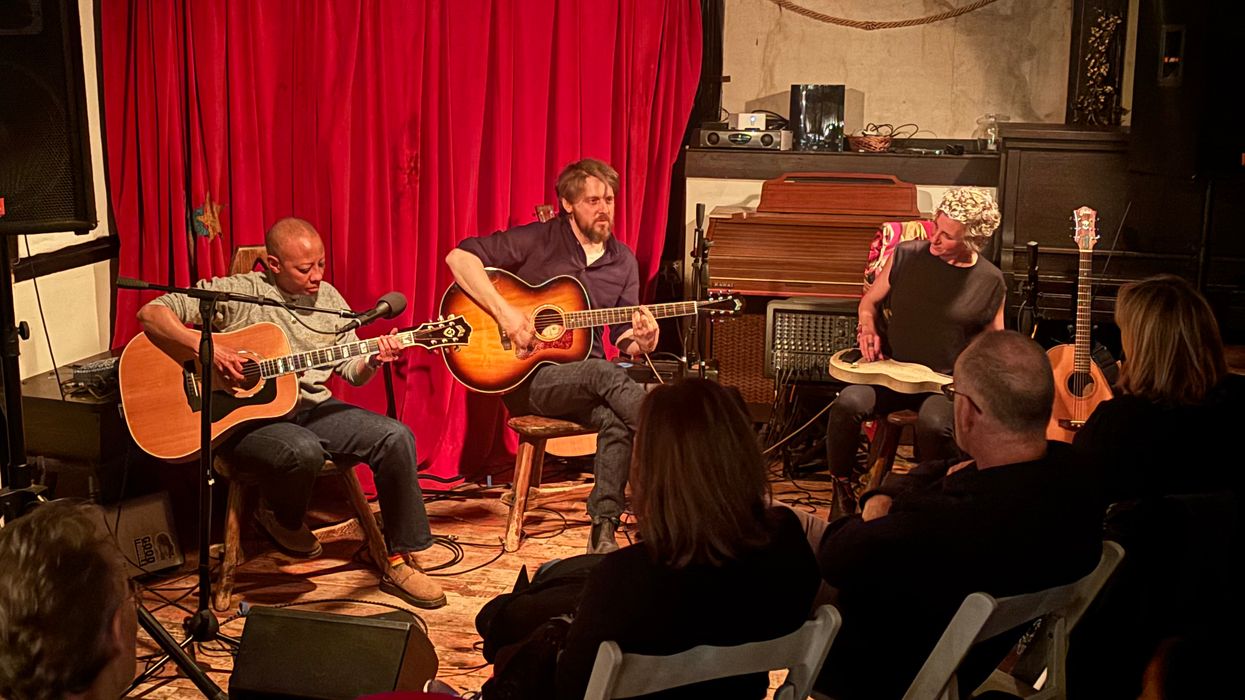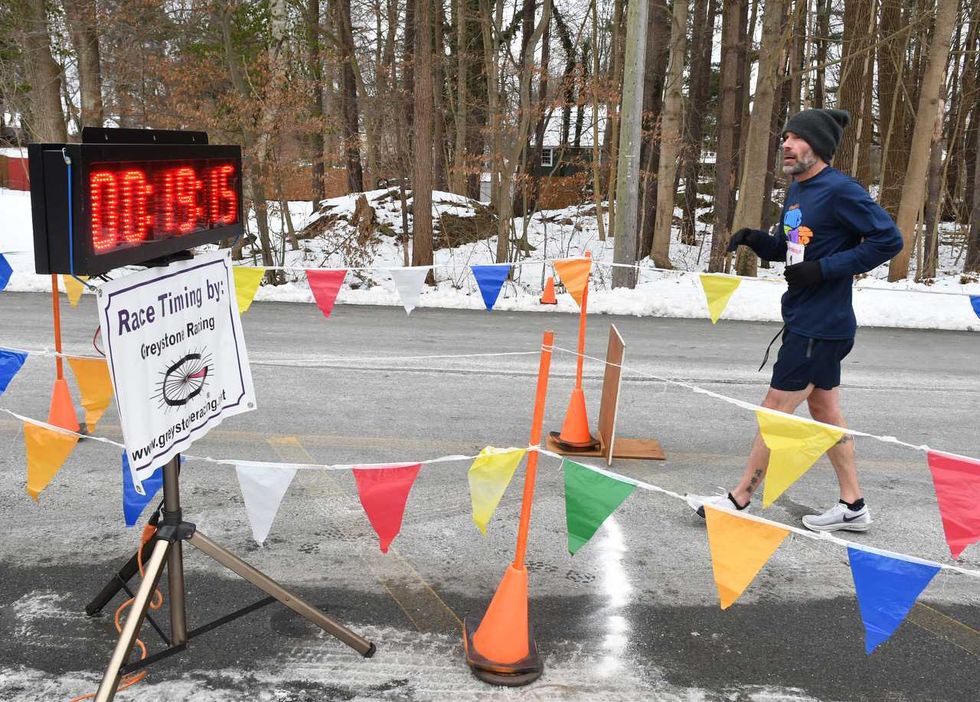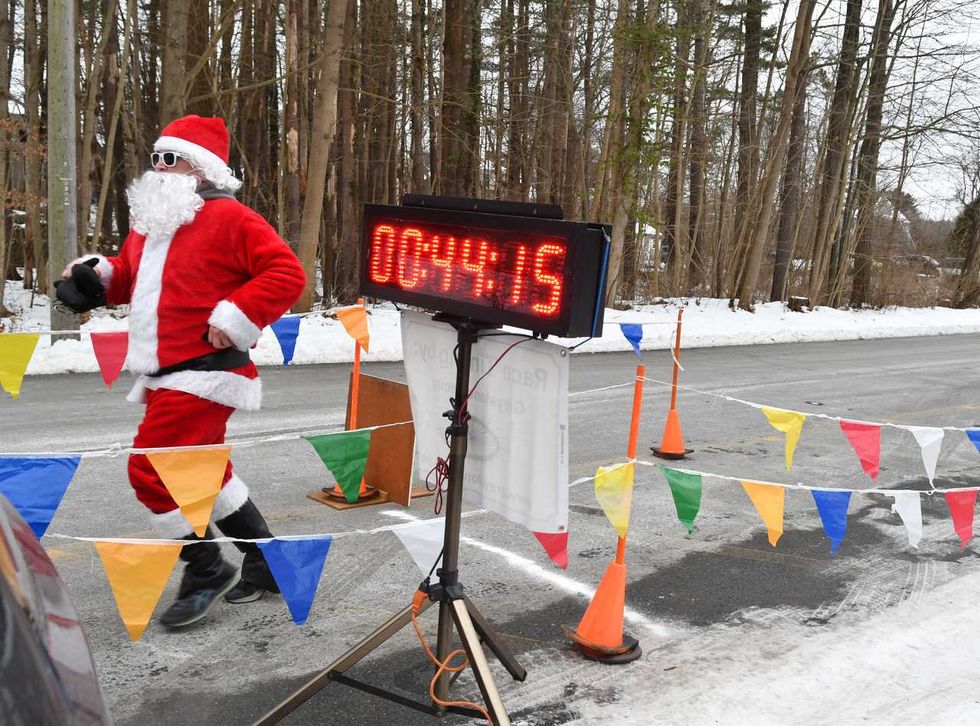Singer-songwriters ‘break the fourth wall’ at Down County Social Club

Left-to-right, musicians Gail Ann Dorsey, Séamus Maynard and Natalia Zukerman in-the-round at Race Brook Lodge.
Alec Linden

Left-to-right, musicians Gail Ann Dorsey, Séamus Maynard and Natalia Zukerman in-the-round at Race Brook Lodge.
Singer-songwriters Natalia Zukerman, Gail Ann Dorsey, and Séamus Maynard conjured “the conversational nature of reality” at a free-flowing performance for the Race Brook Lodge’s Down County Social Club on the evening of Thursday, May 8. The trio traded tunes for about an hour and a half, allowing the music to develop in dialogue with each other, the audience, and even an exploding amplifier.
Alex Harvey, who curates the speakeasy-style shows of the DCSC, offered the above words while introducing the three musicians. The ethos of the DCSC is to “break down the barrier” between the artists and audience; to make it “hard to hold up a fourth wall even if they wanted to.”
A mid-show equipment meltdown ensured this, requiring the musicians to go unplugged for the remainder of the night. Amplified or acoustic, though, the artists needed no assistance in cultivating a deeply conversational atmosphere that complemented the warm, rustic interior of the Lodge’s Pine Grove Porch.
Harvey said he was thrilled when Zukerman pitched the idea. “The caliber Natalia was talking about is mind-blowing,” he said during his introduction.
Zukerman was joined by Dorsey, a world-renowned bassist who was a core member of David Bowie’s band from 1995-2004 and has recorded and toured with other giants such as Tears for Fears, Lenny Kravitz and the National, and Maynard, a singer and virtuosic guitarist who Zukerman said “blew [her] mind” after finding him through Craryville, New York community market and performance venue, Random Harvest.
Zukerman, who is also the cartoonist and Compass editor for this newspaper, a role she took after full-time touring for over 15 years, said in an interview a few days after the show that she loves the “in the round” style format that structured the performance. Each musician played a song, back to back to back, sometimes improvising accompaniment over each other’s music.
“I just think singer-songwriters lend themselves to that,” she said. “You get to really broaden beyond yourself.”
The chemistry between the three artists was palpable, though they had never shared a stage prior to Thursday evening. Early in the set, a theme of struggle and mental health developed, with Zukerman reminding the room that May is Mental Health Awareness Month. Zukerman sang a song called Widow’s Walk about committing a friend to an mental healthcare center (“I’m just waiting for you on this widow’s walk,” went the refrain), which Maynard followed with a minor key, Bert Jansch-informed fingerpicked guitar pattern with a turbulent chorus (“Once more into the fray go I/ no flame of hell ever held a candle to the light”).
Dorsey answered with a “lullaby” to loved ones she had lost to suicide, with her clear, soaring voice carrying a spectral guitar melody, assuring them of “an army of compassion on your side.”
After the show went acoustic, the tone changed and collaboration ensued, at one point involving all three with Zukerman contributing wilting slide guitar accompaniment and Dorsey adding some rhythmic plucking over Maynard’s lively fingerpicking.
The remainder of the session was characterized by a dynamic cadence between Zukerman’s complex guitar and layered storytelling (often accentuated with a dry wit), Maynard’s explosive yet deeply controlled playing and dense songwriting, and Dorsey’s powerful voice and gentle folk melodies.
Zukerman said she’s hopeful that the format will become a series in the future, but may have to take the show elsewhere as the Race Brook Lodge will be closing at the end of the year. Owner Casey Rothstein-Fitzpatrick assured that the Lodge’s cultural programming will remain robust through November, but will wrap up after that.
And how does Zukerman manage to organize shows and play music while working as a full-time editor and creator at the Lakeville Journal (not to mention the many additional roles she holds in other cultural institutions)? It’s all about loving what you do, she said.
“At the end of the day, I spend my time playing music, writing, teaching, drawing, talking to brilliant people,” she said. “I feel incredibly privileged to get to do what I do.”
Housatonic Valley Regional High School, where the price of school lunch will increase to $4.00 beginning Jan. 5.
FALLS VILLAGE -- School lunch prices will increase at select schools in Regional School District No. 1 beginning Jan. 5, 2026, following a deficit in the district’s food service account and rising food costs tied to federal meal compliance requirements.
District officials announced the changes in a letter to families dated Monday, Dec. 15, signed by Superintendent Melony Brady-Shanley and Business Manager Samuel J. Herrick
Under the new pricing, lunches at Lee H. Kellogg School and Cornwall Consolidated School will increase by 25 cents to $3.75, while lunches at Housatonic Valley Regional High School will rise by 50 cents to $4.00.
According to the district, the food service program depends on revenue from lunch sales as well as federal reimbursement. Increased food costs and compliance requirements contributed to the shortfall during the 2024–2025 fiscal year.
School lunch prices have remained unchanged since the 2019–2020 school year, prior to the COVID-19 pandemic. In the years that followed, the district used COVID-19 relief funds to allow students to receive lunches at no cost.
Families who believe they may qualify for free or reduced-price lunch may apply at any time during the school year. Applications are available online for Housatonic Valley Regional High School, Lee H. Kellogg School and Cornwall Consolidated School.
The lunch price increase applies only to these three District No. 1 schools, as Housatonic Valley Regional High School oversees the food service programs at Lee H. Kellogg School and Cornwall Consolidated School. Other schools in the district operate independent food service programs and are not affected.
Runners line up at the starting line alongside Santa before the start of the 5th Annual North Canaan Santa Chase 5K on Saturday, Dec. 13.
NORTH CANAAN — Forty-eight runners braved frigid temperatures to participate in the 5th Annual North Canaan Santa Chase 5K Road Race on Saturday, Dec. 13.
Michael Mills, 45, of Goshen, led the pack with a time of 19 minutes, 15-seconds, averaging a 6:12-per-mile pace. Mills won the race for the third time and said he stays in shape by running with his daughter, a freshman at Lakeview High School in Litchfield.

Don Green, 64, of Red Hook, New York, was second among male runners with a time of 21:17 and a 6:52-per-mile pace. Becky Wilkinson, 47, of Southfield, Massachusetts, was the first woman to cross the finish line with a time of 22:16, averaging a 7:11-per-mile pace. Wilkinson finished fourth overall.
Margaret Banker, 52, of Lakeville, finished second among women runners with a time of 23:59 and a 7:44-per-mile pace.
Runners came from all over Connecticut, Massachusetts and New York. One runner listed home as London, England. Many were members of the Run 169 Towns Society, a group that is dedicated to completing races in every one of Connecticut’s 169 towns. Elizabeth Smith, 32, of Manchester, a member of Run 169, said this was her 162nd town.
“I started 10 years ago,” Smith said. Her husband, Daniel, 33, has run races in 73 Connecticut towns, now including North Canaan. He was eager to know where to get a good cup of coffee after the race.
Santa, who got a head start on the group of runners but finished next to last with a time of 44:14, has been a feature in the North Canaan race since it started five years ago.
The 5K proceeds from a start in front of the North Canaan Elementary School on Pease Street to course around the Town Hall parking lot, up West Main Street past the transfer station to the state line and back. Cheryl Ambrosi, 45, of Danbury, was the last to cross the finish line with her dog Benji. “It was so much fun,” she said as she ended, even though she didn’t catch Santa.

The Torrington Transfer Station, where the Northwest Resource Recovery Authority plans to expand operations using a $350,000 state grant.
TORRINGTON — The Northwest Resource Recovery Authority, a public entity formed this year to preserve municipal control over trash and recycling services in northwest Connecticut, has been awarded $350,000 in grant funds to develop and expand its operations.
The funding comes from the Department of Energy and Environmental Protection via its Sustainable Materials Management grant program. It is intended to help the NRRA establish operations at the Torrington Transfer Station as well as support regional education, transportation, hauler registration and partnerships with other authorities.
Founded by the City of Torrington in May 2025, the NRRA was established to oversee regional municipal solid waste management. Its creation followed a $3.25 million offer by USA Waste & Recycling to purchase the Torrington Transfer Station — a sale that would have privatized trash services in the region.
The proposed sale was initially approved by the MIRA Dissolution Authority, the entity responsible for dissolving the state’s former Materials Innovation and Recycling Authority, which owned the Transfer Station at the time. Before the transaction could close, the state intervened and directed that the facility’s operating permit be assigned to the NRRA to preserve a publicly controlled alternative.
MIRA has since dissolved, and the Transfer Station is currently operated by the state Department of Administrative Services. Many towns in northwest Connecticut have expressed interest in joining the NRRA. As of December, Torrington and Goshen were the only two municipalities in the authority.
At the Dec. 11 meeting of the Northwest Hills Council of Governments (COG) — a regional planning body representing 21 municipalities in northwest Connecticut — Director of Community and Economic Development Rista Malanca encouraged more towns to sign on.
“We need towns to join the Northwest Resource Recovery Authority to show your support, show this is what you want to do,” Malanca said.
Salisbury First Selectman Curtis Rand said his municipality is planning a town meeting in January to vote on a resolution to join the NRRA. Cornwall’s Board of Selectmen recently discussed scheduling a town meeting in the winter for the same purpose. Sharon, Falls Village and North Canaan have also expressed continued interest in pursuing a public option.
Kent is the northernmost member of the Housatonic Resource Recovery Authority, a regional solid waste authority representing 14 municipalities stretching south to Ridgefield. COG towns expressed interest in joining HRRA in 2024, but they were denied and set out to develop the NRRA.
“We also have been having conversations with the Capital Region Council of Governments and the Naugatuck Valley Council of Governments to think about how we can use existing resources, maybe some of these grant funds, to bring in shared resources or shared staffing that will help with some of the recycling coordinating efforts,” Malanca said.
With grant funds secured, NRRA aims to grow to a point that it can take over operations at Torrington Transfer Station to serve as a regional hauling hub. What happens to the trash after that has yet to be determined. Currently, it is being shipped to a landfill out of state. The existing municipal refuse hauling contracts that were established with the state expire in 2027.
The Salisbury Winter Sports Association (SWSA) will host its annual Junior Jump Camp, a two-day introduction to ski jumping, on Saturday and Sunday, Dec. 27 and 28, from 9 a.m. to 2 p.m. at Satre Hill in Salisbury.
The camp is open to children ages 7 and up and focuses on teaching the basics of ski jumping, with an emphasis on safety, balance and control, using SWSA’s smallest hill. No prior experience is required.
The cost is $50 per child and includes instruction and lunch on both days. For more information or to register, visit www.skireg.com/swsa-camp or email info@jumpfest.org